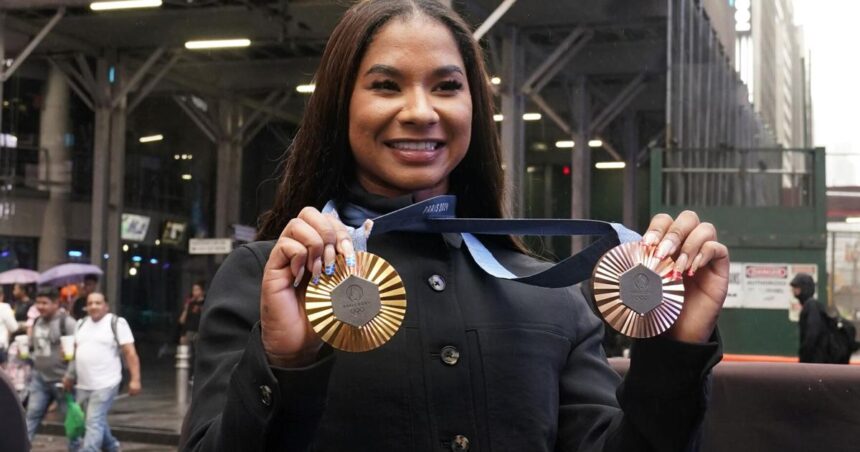U.S. Olympic officials plan to challenge a court ruling that required American gymnast Jordan Chiles to return the bronze medal she won in the Paris Olympics floor exercise.
The Court of Arbitration for Sport (CAS) invalidated an on-floor appeal by Chiles’ coach that moved her to third place, citing that the appeal was made 4 seconds beyond the 1-minute time limit for scoring inquiries.
The International Gymnastics Federation (FIG) announced it would abide by the court’s decision and promote Barbosu to third place. The International Olympic Committee also confirmed the ruling, reallocating the bronze medal from the women’s floor final to Romanian Ana Barbosu.
“We firmly believe that Jordan rightfully earned the bronze medal, and there were critical errors in both the initial scoring by the International Gymnastics Federation (FIG) and the subsequent CAS appeal process that need to be addressed,” stated the U.S. Olympic and Paralympic Committee.
People are also reading…
CAS ruled that Team USA coach Cecile Landi’s inquiry to enhance Chiles’ score by 0.1 was outside the 1-minute window allowed by the FIG. The CAS committee reported that Landi’s inquiry was made 1 minute, 4 seconds after Chiles’ initial score.
The IOC mentioned it will communicate with the USOPC regarding the return of Chiles’ bronze medal and will collaborate with the Romanian Olympic Committee on a reallocation ceremony for Barbosu.
“The initial error occurred in the scoring by FIG, and the second error was during the CAS appeal process, where the USOPC was not given adequate time or notice to effectively challenge the decision,” said the USOPC statement released on Sunday.
The process for appealing the decision is still uncertain. The USOPC could potentially take the appeal to Switzerland’s highest court, the Swiss Tribunal, or the European Court of Human Rights.
CAS outlined that the original finishing order should be reinstated, with Barbosu in third place, Romanian Sabrina Maneca-Voinea in fourth place, and Chiles in fifth place. It was up to the FIG to determine the final ranking in line with the decision, but the federation was given the authority to decide who would receive the medal after gold medalist Rebeca Andrade of Brazil and silver medalist Simone Biles of the U.S.
FIG mentioned that the IOC would decide on reallocation of the medal. The IOC confirmed it would adhere to FIG’s decision and work towards reclaiming Chiles’ medal.
The swift turn of events adds complexity to what has been a challenging period for all three athletes.
Romanian gymnastics legend and 1976 Olympic champion Nadia Comaneci expressed concern for Barbosu’s mental well-being due to the turmoil of going from bronze medalist to fourth-place finisher.
“I can’t believe we play with athletes’ mental health and emotions like this… let’s protect them,” Comaneci posted earlier in the week.
Comaneci also criticized the judges for their scoring of Maneca-Voinea’s routine, urging the Romanian Olympic Committee to protest. The appeal was denied by CAS.
Chiles hinted at the decision in an Instagram story, expressing heartbreak and a need to step back from social media for mental health reasons.
Jazmin Chiles, Jordan’s sister, stated on Instagram that Chiles lost the medal not due to lack of skill, but because of judging errors and a forced inquiry.
Teammates of Chiles extended their support to the two-time Olympian.
“Sending you so much love Jordan,” posted American star Simone Biles on Instagram. “Keep your chin up ‘Olympic champ’ we love you.”
“All this talk about the athlete, what about the judges?” six-time Olympic medalist Sunisa Lee added on Instagram. “Completely unacceptable, this is awful and I’m gutted for Jordan.”
USA Gymnastics expressed devastation at the ruling in a statement on Saturday.
“The inquiry into the Difficulty Value of Jordan Chiles’ floor exercise routine was filed in good faith and, we believed, in accordance with FIG rules to ensure accurate scoring,” the organization stated.
Barbosu and Maneca-Voinea missed out on medals in the floor final despite finishing with identical scores of 13.700. Barbosu believed she had won the bronze based on a tiebreaker—a higher execution score—leading to celebrations with a Romanian flag.
Chiles was initially placed fifth after her routine, but an inquiry by Landi following the announcement of her score led to her leapfrogging Barbosu and Maneca-Voinea.
Barbosu emphasized upon returning to Romania that she held no ill will towards Chiles.
“I only want for everybody to be fair, we don’t want to start picking on other athletes of any nationality,” Barbosu told reporters. “We as athletes don’t deserve something like that, we only want to perform as best as we can and to be rewarded based on our performance. The problems lie with the judges, with their calculations and decisions.”
Chiles’ mother, Gina Chiles, defended her daughter against critics, expressing fatigue with the negative comments directed at Jordan.
“My daughter is a highly decorated Olympian with the biggest heart and a level of sportsmanship that is unmatched,” Gina Chiles wrote. “And she’s being called disgusting things.”
The uncertainty surrounding the situation taints what was initially a beautiful moment on the medal stand, when Chiles and Biles knelt to honor Andrade following her fourth medal win in Paris.
“It was just the right thing to do,” Biles remarked about the gesture that went viral, with even the Louvre suggesting it might deserve a place near the Mona Lisa.
This moment now carries a complex and emotional aftermath.
Associated Press writer Stephen McGrath and AP Sports Writers Eddie Pells and Graham Dunbar contributed to this report.





